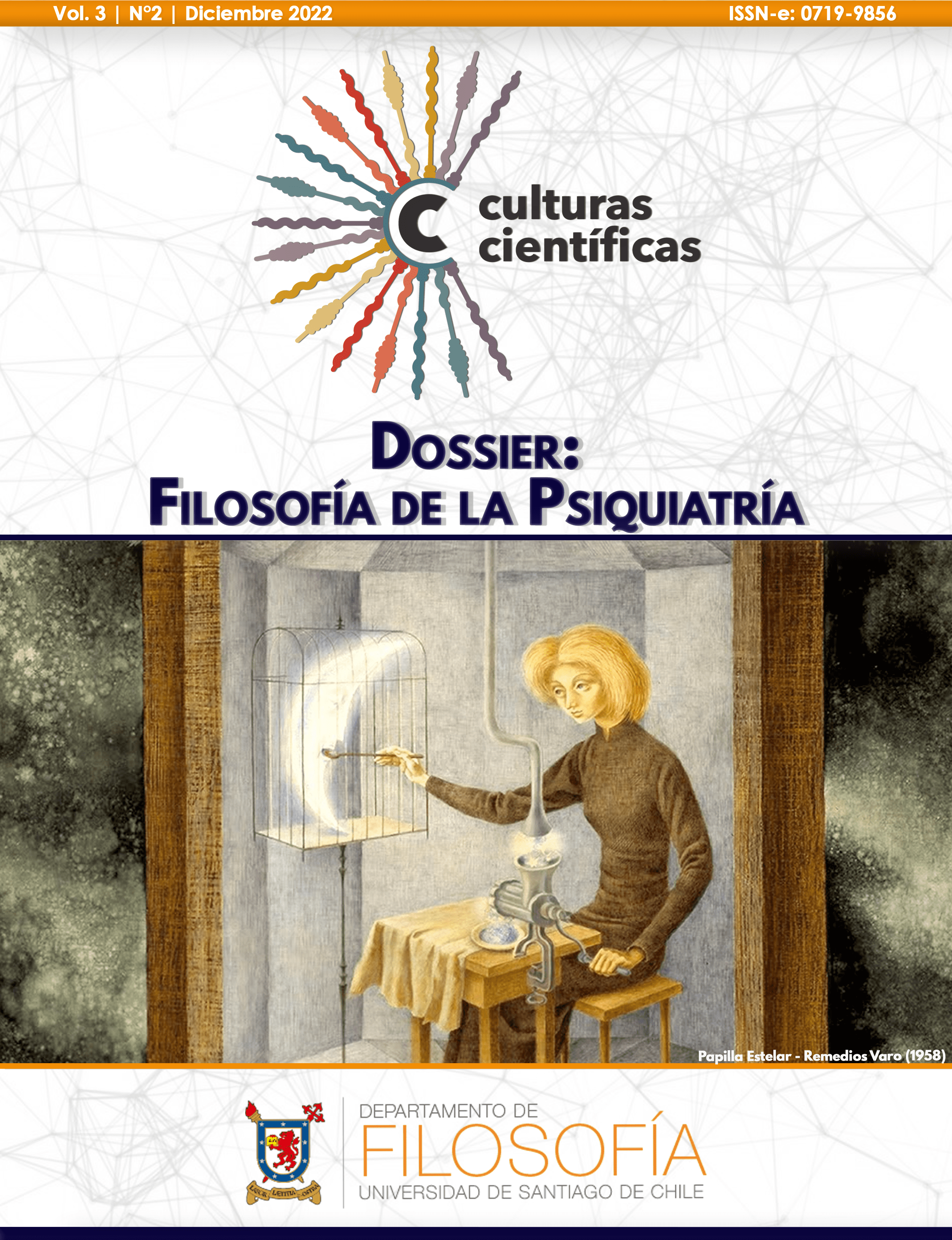The Ontological Status of Psychopathology
an Overview
DOI:
https://doi.org/10.35588/cc.v3i2.5809Keywords:
Psychopathology, Psychiatry, Phenomenology, Constructivism, Anti-psychiatryAbstract
We analyze the ontological status of the notion of psychopathology derived from four methodological approaches to its study: psychiatric, phenomenological-existential, constructivist-historical, and anti-psychiatric. Using a systematized literature review methodology and following the metaframework ReSiste-CHS (Systematized Reviews in Human and Social Sciences), we will argue that this notion presents divergences in at least three points: (i) the relevance of symptomatology as a characteristic, (ii) the existence or non-existence of psychic suffering, and (iii) the relevance of social factors in its configuration. In the introductory section, we will address general historical considerations related to the study of mental disorders. In the second section, we will refer to the methodology used for the realization of the article. In the third section, we will present the fundamental features of the four study methodologies mentioned above, dividing the description into the following points: orientation, etiology, classification, diagnosis, and treatment. In the fourth section, we will contrast the concepts of psychopathology extracted from them. To conclude, we will propose a systematization of the minimum conditions that a notion of psychopathology must fulfill in order to be fruitful from a theoretical and practical point of view. These conditions include a critical stance against the reductionist and relativist extremes, the consideration of psychic suffering as a constitutive feature and fundamental core of this genre of experience, as well as an ethical dimension related to its approach. Finally, we will show some limitations and future directions derived from the work carried out.
Downloads
References
Aho, J. y Aho K. (2009). Body Matters: A Phenomenology of Sickness, Disease, and Illness. Lexington Books. https://cutt.ly/3NQcx4L
Alves, P. (2020). Genesis. En D. De Santis, B.C. Hopkins y C. Majolino (Eds.), The Routledge Handbook of Phenomenology and Phenomenological Philosophy (pp.207-220). Routledge Press. https://cutt.ly/gNQcTWk
American Psychiatric Association (2022). Diagnostic and Statistical Manual of Mental Disorders. Fifth Edition, Text revision. American Psychiatric Publishing. https://doi.org/h72z
Bak, A. (2019). Sobre la noción de estilo en la fenomenología husserliana. Devenires, 20, 183-213.
Bertelli, M.O., Sturmey, P., Elstner, S., y Stanghellini, G. (2022). Psychopathology and Mental Status Examination. En M.O. Bertelli, S. Deb, K. Munir, A. Hassiotis y L. Salvador-Carulla (Eds.), Textbook of Psychiatry for Intellectual Disability and Autism Spectrum Disorder (pp. 123-143). Springer. http://doi.org/10.1007/978-3-319-95720-3_6
Binswanger, L. (1972). Introduction à l'analyse existentielle. Minuit.
Binswanger, L. (1987). Mélancolie. Manie. Puf.
Blankenburg, W. (1983). La psicopatología como ciencia básica de la psiquiatría. Revista Chilena de Neuro-psiquiatría, 21(3):177-188.
Codina, L. (2020). Revisiones bibliográficas sistematizadas en Ciencias Humanas y Sociales. En, C. Lopezosa, J. Díaz-Noci, y L. Codina (Eds.), Methodos. Anuario de métodos de investigación en comunicación social (pp. 50-87). Universitat Pompeu Fabra. http://dx.doi.org/10.31009/methodos.2020.i01.00
Cooper D. (1967). Psychiatry and Anti-Psychiatry. Tavistock Publications.
Deleuze, G. (2013). El saber. Curso sobre Michel Foucault. I (Trad. P. Ires y S. Puente). Cactus.
Deleuze, G. (2014). El poder. Curso sobre Michel Foucault. Volumen II (Trad. P. Ires y S. Puente). Cactus.
Deleuze, G. (2015). La subjetivación. Curso sobre Michel Foucault. Volumen III (Trad. P. Ires y S. Puente). Cactus.
Deleuze, G. y Guattari, F. (1972). L'anti-OEdipe : Capitalisme et schizophrénie. Minuit.
Deleuze, G. y Guattari, F. (1980). Mille Plateaux. Capitalisme et schizophrénie. Minuit.
Englebert, J. (2021). Le «soi territorial» : propositions théoriques à partir d'une compréhension phénoménologique de la schizophrénie. L'Évolution Psychiatrique, 86(4):1-10. https://doi.org/10.1016/j.evopsy.2021.03.011
Engstrom, E. J., y Kendler, K.S. (2015). Emil Kraepelin: icon and reality. American journal of psychiatry, 172(12), 1190-1196. https://psycnet.apa.org/doi/10.1176/appi.ajp.2015.15050665
Fanon, F. (2002). Les damnés de la terre. La Découverte.
Foucault, M. (1972). Histoire de la folie à l'âge classique. Gallimard.
Foucault, M. (2015). Naissance de la clinique. Puf.
Foucault, M. (2016). Enfermedad mental y psicología (Trad. A.Bixio). Paidós.
Fountoulakis, K. N. (2022). Psychiatry: From its Historical and Philosophical Roots to the Modern Face. Springer. https://doi.org/10.1007/978-3-030-86541-2
Fuchs, T. (2007). Psychotherapy of the Lived Space: A Phenomenological and Ecological Concept. American Journal of Psychotherapy, 61(4), 423-439. https://doi.org/10.1176/appi.psychotherapy.2007.61.4.423
Fuchs, T. y Schmidt, Ph. (2020). The Unbearable Dispersal of Being: Narrativity and Personal Identity in Borderline Personality Disorder. Phenomenology and the Cognitive Sciences, 20, 321–340. https://doi.org/10.1007/s11097-020-09712-z
Gozé, T. (2020). Expérience de la rencontre schizophrénique. De la bizarrerie de contact. Hermann Éditions.
Grant, M.J., y Booth, A. (2009). A Typology of Reviews: an Analysis of 14 Review Types and Associated Methodologies. Health Information & Libraries Journal, 26(2), 91-108. http://doi.org/10.1111/j.1471-1842.2009.00848.x
Hoff, P. (2004). Psychiatry as a Clinical Science. From Emil Kraepelin to Neo-Kraepelinism. Vertex, 15(55), 42-47.
Husserl, E. (2014). La filosofía como ciencia estricta (Trad. E. Tabernig). Prometeo.
Husserl, E. (2021). Conciencia del sentimiento-Conciencia de sentimientos (Trad. A. Zirión-Quijano). En C. Cabrera y M. Szeftel (Eds.), Fenomenología de la vida afectiva (pp.307-340). SB.
Jaspers, K. (2014). Psicopatología general (Trad. R. Saubidet y D. A. Santillán). Fondo de cultura económica.
Jiménez-Molina, A. y Orchard, M. (2016). ¿Malestar de qué? A propósito de ciertos malentendidos entre malestar social y sufrimiento psíquico en Chile. En E. Radiszcz (Ed.), Malestar y destinos del malestar. Políticas de la desdicha. I (pp. 72-95). Social-Ediciones.
Jiménez-Molina, A., Abarca-Brown, G. y Montenegro, C. (2019). No hay salud mental sin justicia social: desigualdades, determinantes y salud mental en Chile. Revista de Psiquiatría Clínica, 57:7-20. https://revistapsiquiatriaclinica.uchile.cl/index.php/RPSC/article/view/65638
Klerman G. L. (1978). The Evolution of a Scientific Nosology. En, J.C. Shershow (Ed.), Schizophrenia: Science and Practice (pp. 99-121) Harvard University Press. https://cutt.ly/tBHKmXX
Kraepelin, E. (1899). Psychiatrie. Ein Lehrbuch für Studierende und Aerzte. J.A. Barth. https://catalog.hathitrust.org/Record/008924544
Lagos, R. (2020). Clasificar en psiquiatría y el DSM-V: algunas reflexiones con y más allá de Georges Canguilhem. HYBRIS, Revista de Filosofía, 11(2):13-44. https://doi.org/10.5281/zenodo.4320769
Laing, R. D., y Esterson, A. (1964). Sanity, Madness, and the Family: Families of Schizophrenics. Penguin.
Laing, R.D. (1960). The divided self. Tavistock.
Levinas, E. (2001). El sufrimiento inútil (Trad. J. L. Pardo). En Entre nosotros. Ensayos para pensar en otro (pp.109-126). Pre-textos.
Maldiney, H. (2007). Penser l’homme et la folie. Millon.
Merleau-Ponty, M. (1945). Phénoménologie de la perception. Gallimard.
Minkowski, E. (2013). Le temps vécu. Études phénoménologiques et psychopathologiques. Puf.
Murakami, Y. (2012). Sobre la disociación en el momento de la experiencia traumática. El sentido fenomenológico de la psicopatología a la luz de Lévinas (Trad. P. Posada). Investigaciones fenomenológicas, 9, 221-248.
Parnas, J. y Zahavi, D. (2002). The Role of Phenomenology in Psychiatric Diagnosis and Classification. En M. Maj, W. Gaebel, J. J. López-Ibor, y N. Sartorius (Eds.), Psychiatric Diagnosis and Classification (pp.137-162). John Wiley and Sons. https://psycnet.apa.org/doi/10.1002/047084647X.ch6
Pereira-Perdomo, P. y Zúñiga-Iturra, B. (2020). Sentido de agencia y sus disrupciones en la depresión: una perspectiva interdisciplinar. Límite. Revista interdisciplinaria de filosofía y psicología, 15, 1-12. http://dx.doi.org/10.4067/s0718-50652020000100208
Pérez-Soto, C. (2012). Una nueva antipsiquiatría. Crítica y conocimiento de las técnicas de control psiquiátrico. Lom.
Pinel, P. (1797). Nosographie philosophique ou La méthode de l'analyse appliquée à la médecine. Maradan. https://gallica.bnf.fr/ark:/12148/bpt6k85083b/f1.item#
Pinel, P. (1801). Traité médico-philosophique sur l'aliénation mentale, ou La manie. Richard, Caille et Ravier. https://gallica.bnf.fr/ark:/12148/bpt6k432033/f4.item.texteImage
Reil, J.C. (1808). Ueber den Begriff der Medicin und ihre Verzweigungen, besonders in Beziehung auf die Berichtigung der Topik der Psychiaterie. En, J.C. Reil y J.C. Hoffbauer (Ed.), BeytrÄge zur Beförderung einer Kurmethode auf psychischem Wege, (pp.161–279). Curt'sche Buchhandlung. https://cutt.ly/NBGwJwg
Richir, M. (1992). Phénoménologie et psychiatrie: D’une division interne à la Stimmung. Études Phénoménologiques, 8:81-117.
Richir, M. (2004). Phantasia, imagination, affectivité. Phénoménologie et anthropologie phénoménologique. Millon.
Richir, M. (2021). Sentido e historia. Eikasia. Revista de Filosofía, 105:20-50.
Rissmiller, D. y Rissmiller, J. (2006). Evolution of the Antipsychiatry Movement into Mental Health Consumerism. Psychiatric Services, 57(6):863–866. https://doi.org/10.1176/ps.2006.57.6.863
Rosenhan, D. L. (1973). On being sane in insane places. Science, 179(4070):250–258.
Rovaletti, M. (2018). Antropología clínica: entre la filosofía de la psiquiatría y las ciencias humanas. Vertex. Revista Argentina de Psiquiatría, 29:349-360.
Ruperthuz, M. (2018). Estimado Dr. Freud: una historia cultural del psicoanálisis en América Latina. Edhasa.
Ruperthuz, M. y Campos, R. (2022). Higiene mental, psiquiatría y sociedad en Iberoamérica (1920-1960). Catarata.
Sontag, S. (1996). La enfermedad y sus metáforas. El sida y sus metáforas. (Trad. M. Muchnik). Taurus.
Stanghellini, G. (2009). The meanings of psychopathology. Current Opinion in Psychiatry, 22(6):559-564. http://doi.org/10.1097/YCO.0b013e3283318e36
Steinbock, A. (1995). Home and beyond. Generative phenomenology after Husserl. Northwestern University Press.
Svenaeus, F. (2018). Phenomenological Bioethics Medical Technologies, Human Suffering, and the Meaning of Being Alive. Routledge.
Szasz, T.S. (1960). The Myth of Mental Illness. American psychologist, 15(2):113–118. https://doi.org/10.1037/h0046535
Wehrle, M. (2021). Situating Normality. The Interrelation between Lived and Represented Normality. Chiasmi International, 3, 1-28. https://doi.org/10.5840/chiasmi20212322
Zahavi, D. y Loidolt, S. (2022). Critical Phenomenology and Psychiatry. Continental Philosophy Review, 55(3), 55-75. https://doi.org/10.1007/s11007-021-09553-w











